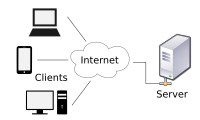
Photo from wikipedia
A wireless network of ${N}$ transmitting and ${M}$ receiving nodes is considered, where the goal is to communicate data from transmitters to the receiving side of the network. Nodes have… Click to show full abstract
A wireless network of ${N}$ transmitting and ${M}$ receiving nodes is considered, where the goal is to communicate data from transmitters to the receiving side of the network. Nodes have energy suppliers that provide energy at a price for transmission or reception. Nodes wish to optimize their individual utilities rather than a network-wide utility. We consider one-to-one and one-to-many matching games where each transmitter can be matched with one or multiple receivers. In both cases, transmitters find the best rate for them and propose it to the receivers. We modify the well-known deferred acceptance algorithm to solve this game and improve network sum utility. We next consider wireless energy cooperation for the transmitters to make their proposals more desirable and compete with each other. Energy transfer introduces an additional energy cost at the transmitter and reduces the cost of the receiver and influences its decision. For the one-to-many matching games, we demonstrate that the available proposals at each transmitter can be reduced without loss of optimality. The results point to the observation that populating the network with additional nodes along with the possibility of energy transfer improves the rates for the entire network despite the selfish nature of the nodes.
Journal Title: IEEE Transactions on Green Communications and Networking
Year Published: 2017
Link to full text (if available)
Share on Social Media: Sign Up to like & get
recommendations!